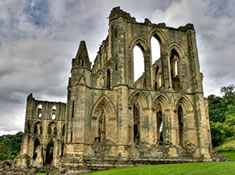
Rievaulx Abbey. Photo by Mike Peel
Apocyrphal Saints: John of Rievaulx1
I’m not a heretic. Beginning was the Word
and the Word was with God. For this translation, then,
I was instructed to remove myself
for contemplation of the text within
the confines of my cell—two simple rooms,
a window large enough for light, a desk
(and still on it, the open scroll). Again
I sat before the words and prayed the psalm:
Illumine my darkness, my Lord, my God.
And for a second time the flame appeared
inside the word beginning: bursting white
to golden edged with blue, then—eye-wide—black.
The night was quiet, I recall, the light
a moonlit shaft across the desk, where wisps
of smoke intent on tracing the ascent
of their demise began to lift above
the dark lacuna. (One can see, no doubt,
the problem of interpretation here:
In the beginning was the flame. Or this:
In the was the Word. Finally, I suspect,
they’ll call me crazy, or perhaps possessed.
Particularly for these final things,
I imagine, I’ll see the flame again—
my body like a wick, translated far
too literally.)
Then, and this is true,
the breach began to spread across the text
until at last the surface of the desk
seemed in the moonlight like an obelus—
black as ink but for a flickering of light
in its—how to explain this?—depth. Surprised,
I jumped to grasp the disappearing scroll,
but found the stable surface wholly changed
once more—my arm had moved into the desk.
(Yet, underneath, its reach remained unseen,
though felt, on what I only later learned
were cold stone stairs descending through the dark.)
But this is not my point. You understand,
I hope, the only point is in the word
beginning in the text—from this I came
to feel (no doubt descending through it helped)
the words In the were wrong, mistakes of time
and place. I think you would agree, the words
imply a preexisting state, a space
which held concurrently the Holy One.
But I—unworthy of such vision—saw
within the chasm dark the flame take form.
And, yes, I did descend the stairs that night.
It’s true: enormity does not begin
to describe the things I saw—such glory there,
and all beginning in a single Word.
Matt Malyon
in darkness, I confess, and to the tune
of Compline bells, which, come to think of it,
remind me of the Father Abbot’s words:
‘Far greater men have burned for lesser sins’.”

